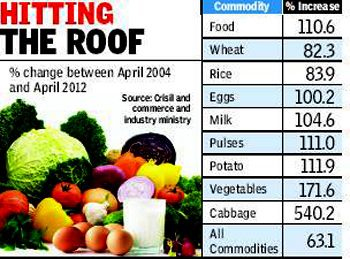
New Delhi, May 16: If inflation has broken the back of the aam aadmi, the biggest contributor to the pain in the UPA's term is food prices.
Government data on wholesale price index (WPI) shows that there has been a 63% increase in the price of all commodities between April 2004, a month before UPA took charge, and April 2012, the latest period for which data is available. But when it comes to food products, the index has more than doubled from 98 to 206.4. So, you are now spending at least twice the amount you spent in April 2004 just to meet your basic consumption needs.
Of the 60-odd items analyzed by TOI and Crisil, there is just one case - ginger - where the price has decreased, going by the index. In all other cases, there has been an increase. Within these commodities, there are only eight products - guava, coconut, garlic, papaya, onions, turmeric, tea and chicken - where the rise in prices is less than 63%.
For households, especially the poor, food inflation can have the most damaging impact, given that a bulk of spending in the lower income strata is on this segment. While the poor can draw some comfort from the fact that cereal prices are not among the commodities which have seen the maximum jump, the overall increase is still over 90% with wheat and rice, on an average, seeing over 80% increase.
While protein-rich items such as milk, egg, meat and fish have seen prices more than double, it is vegetables that have caused the maximum dent to the housewife's monthly budget. This segment has seen a 171% jump. So, if you spent Rs 3,000 a month on vegetables seven years ago, you would now be spending over Rs 5,000. Given that cabbage now costs six-and-a-half times more than April 2004, you can draw comfort from the fact that during this period, potato and brinjal prices have only gone up by 111% and 140%, respectively. Similarly, bhindi now costs four-and-a-half times more.
Even fruits have seen a lower spurt of around 90% with prices of mangoes, oranges, apples and pineapple more than doubling. When it comes to spices, black pepper has seen the biggest jump (335%). Coffee makes up the top five commodities in terms of price rise with an increase of 269%.





Comments
Add new comment